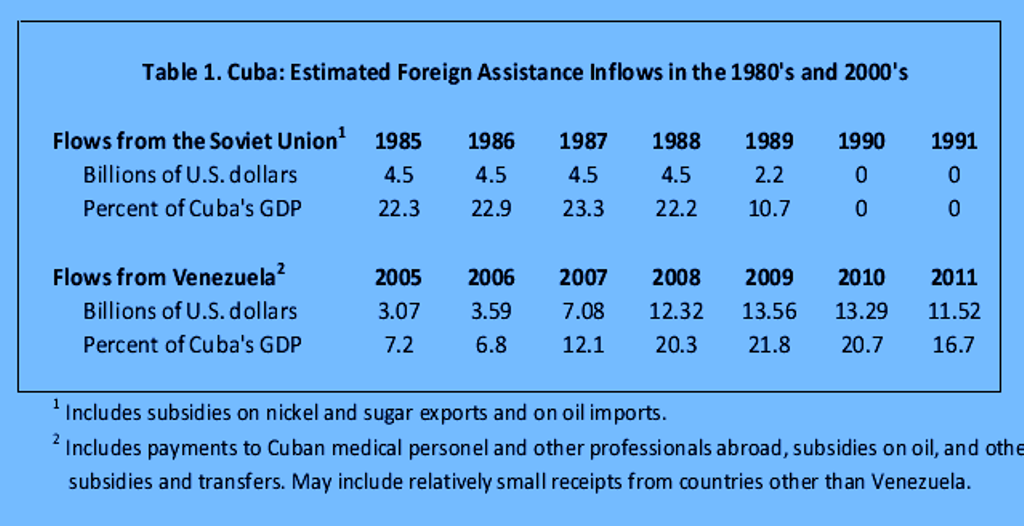By Ernesto Hernández-Catá
Ernesto Hernández-Catá has produced some estimations of the value of Venezuelan assistance to Cuba. His complete analysis is presented here: Hernández-Catá CubaVenezuela Paper. The Introduction and Conclusion are presented below together with a summary chart.
Introduction
In October 2010 Cuba and Venezuela signed the Integral Cooperation Agreement (Convenio Integral de Cooperación) under which Venezuela would provide a variety of subsidies and transfers to Cuba, including a large subsidy on oil imports. Cuba also would send medical personnel, teachers, and military and security advisers to Venezuela and (on much smaller scale) to other “friendly” countries in Latin America (including Bolivia, Nicaragua). The salaries of these professionals would be paid by the Venezuelan government.
Official data on these operations have never been released. The estimates presented in this paper are subject to significant errors and omissions, but they are probably a reasonably good approximation of the truth. They suggest that the inflows involved have been very large relative to the size of the Cuban economy and in comparison with those provided by the Soviet Union in the 1980’s. Soviet assistance was slashed by Russia in 1989 and eliminated by Russia in 1990, resulting in a deep contraction of the Cuban economy. A crisis of comparable magnitude could occur if the assistance now provided by Venezuela were to disappear.
Conclusion
Inflows of funds from Venezuela increased rapidly during the first decade of the XXI century and peaked in 2008 at around $13 billion or roughly 22 percent of Cuba’s GDP. Since then the inflows appear to have declined somewhat, although in 2011 they were still about 17 percent of GDP. The dependence on Venezuelan assistance makes the Cuban economy highly vulnerable to political decisions over which it has little or no control: The Venezuelan government—which faces serious economic problems of its own—may decide at some point that it cannot continue to subsidize the Cuban economy and put an end to the program. As I pointed out in a previous paper, the best way to confront the looming danger is to expand and intensify the process of structural reforms that was initiated a few years ago by President Raul Castro. This would raise productive capacity on a sustainable basis and help to confront the other major danger threatening the Cuban economy: the ageing of its population and the risk that its pension systems will collapse in the long run.
In October 2010 Cuba and Venezuela signed the Integral Cooperation Agreement (Convenio Integral de Cooperación) under which Venezuela would provide a variety of subsidies and transfers to Cuba, including a large subsidy on oil imports. Cuba also would send medical personnel, teachers, and military and security advisers to Venezuela and (on much smaller scale) to other “friendly” countries in Latin America (including Bolivia, Nicaragua). The salaries of these professionals would be paid by the Venezuelan government.
Official data on these operations have never been released. The estimates presented in this paper are subject to significant errors and omissions, but they are probably a reasonably good approximation of the truth. They suggest that the inflows involved have been very large relative to the size of the Cuban economy and in comparison with those provided by the Soviet Union in the 1980’s. Soviet assistance was slashed by Russia in 1989 and eliminated by Russia in 1990, resulting in a deep contraction of the Cuban economy. A crisis of comparable magnitude could occur if the assistance now provided by Venezuela were to disappear.
-------------------------- Ernesto Hernandez-Cata was born in Marianao, Havana, Cuba in 1942. He holds a License from the Graduate Institute of International Studies in Geneva, Switzerland; and a Ph.D. in economics from Yale University. For about 30 years through, Ernesto Hernandez-Cata worked for the International Monetary Fund where he held a number of senior positions. When he retired from the I.M.F. in July 2003 he was Associate Director of the African Department and Chairman of the Investment Committee of the Staff Retirement Plan. Previously he had served in the Division of International Finance of the Federal Reserve Board. From 2002 to 2007 Mr. Hernandez-Cata taught economic development and growth at the Paul Nitze School of Advanced International Studies of the University of Johns Hopkins. Previously he had taught macroeconomics and monetary policy at The American University.

No hay comentarios:
Publicar un comentario